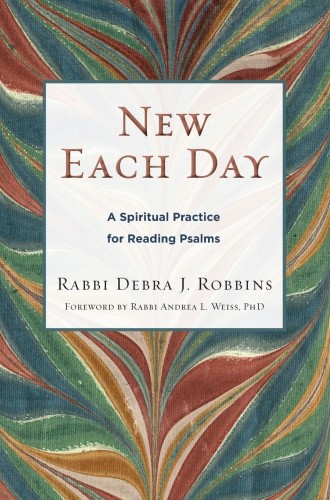Treasures of our ancestors
Rabbi Debra Robbins creates a spiritual practice around the seven psalms of the Jewish morning liturgy.

New Each Day
A Spiritual Practice for Reading Psalms
Sefer Tehillim, the book of Psalms in the Hebrew Bible, is a natural place to begin a spiritual practice. Its 150 poems offer readers a choice of praise, laments, and hymns of thanksgiving. At the same time, 150 is a daunting number that “doesn’t match anything in the natural cycle of Creation,” writes rabbi Debra Robbins. New Each Day focuses on the suite of seven psalms incorporated into the Jewish morning liturgy as Shir Shel Yom, the psalm of the day. Believed to have been sung during services in the ancient temple in Jerusalem, these seven psalms are not the most accessible songs in the psalter. Their integration into the daily prayer service has generated reams of commentary. Robbins invites participants to “relearn how to read” these familiar poems and to embrace the fear, rage, longing, doubt, joy, awe, and overflowing gratitude contained within them.
Beginning with Sunday’s Psalm 24 and continuing with the psalm for each subsequent day of the week (48, 82, 94:1–95:3, 81, 93, and 92), Robbins outlines steps for developing a spiritual practice around reading each song on its appointed day. “Ritual trains the muscles of the heart to reflect, to create, and to connect with emotions, experiences, memories, hope, ourselves, and yes, God,” she explains. For each psalm, she includes the text in Hebrew as well as translations, an introduction, and four separate reflections for focus. She encourages readers to commit to daily practice for a month. (She also includes a section on Psalm 104, which is said on Rosh Chodesh, the start of each Hebrew month coinciding with the new moon.)
Read our latest issue or browse back issues.
Reading a different hymn for each day of the week “helps ensure that we don’t see the new day as the one before,” she notes. The cycle “offers the ideal balanced practice: the psalms remain constant, but the person reading them and the surrounding world are new each day.” Robbins envisions a daily practice of 20 minutes or so, done alone or with a partner, online or in person, in any setting and at any time. She includes suggestions to find a regular place, build a routine, be grateful, and forgive yourself on days when you don’t read every word of the psalm or don’t write your own reflection. “These seven may not be my favorite psalms, but they are the treasures and traditions of my ancestors,” Robbins writes. “I feel connected across time to all the generations before me who have offered the same poems . . . for more than two thousand years. I feel connected with others in my generation whom I will never know, but with whom I am in relationship as we share the same practice, engaging with the same text everyday.”
Robbins’s rabbinic work at Temple Emanu-El in Dallas focuses on spiritual practice, teaching, and pastoral care. Working with congregants to prepare for Rosh Hashanah and Yom Kippur inspired her 2019 book Opening Your Heart with Psalm 27: A Spiritual Practice for the Jewish New Year. Robbins was inspired to write New Each Day when those who had joined her Psalm 27 spiritual practice for the seven weeks before the High Holy Days found themselves missing the daily focus on a psalm after Yom Kippur.
The reflections in New Each Day are diverse, personal, and poetic. Robbins often focuses on one or two verses from the psalm. For example, reflecting on Psalm 48:7 (“With but a wind sent from the east / You smash the ships of Tarshish”), she writes,
Where I live, the wind mostly blows from the west.
. . .
Once, the sky glowed green, humming filled the air,
The west winds twisted themselves together,
touching the ground,
traveling straight from west to east,
hungry.
She brings in moments of common experience: “When the week is long with burdens: loads of laundry or buckets of responsibility, baskets and boxes of anxiety, fear, and pain . . . read Psalm 81,” she writes in her introduction to the psalm for Thursdays.
Robbins reaches out to readers who may not know or remember Hebrew, encouraging them through transliteration to find the shared vocabulary of essential Hebrew words which “can unify the seven psalms in a way that might otherwise go undetected.” Among the key words that appear multiple times in these seven psalms are chesed (loving kindness), mishpat (justice), and tzur (rock), which is one of God’s names.
New Each Day is published by CCAR Press, the primary publisher for the Reform movement in Judaism. While Robbins is clearly creating a Jewish spiritual practice in this book, her use of translation and transliteration makes her ideas accessible to Christian readers, for whom the book of Psalms is a sacred text. Undertake this practice, she suggests, and it “might even change your life, your ideas about God, sacred Scripture, or prayer, your soul, your heart.” She adds, “It will change your day and make it new.”






